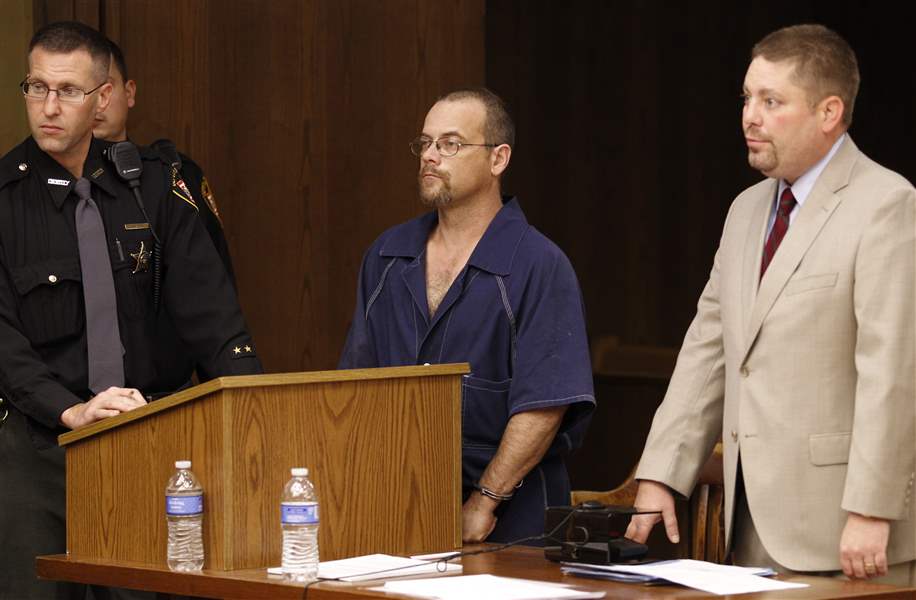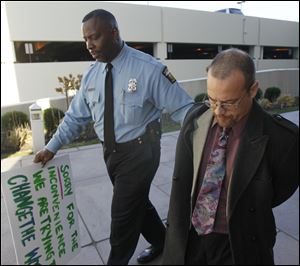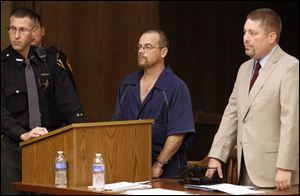
ACLU to probe barring of sign from chamber
11/4/2011
Rick VanLandingham III, center, with public defender Jim Neumeyer, right, is arraigned in Toledo Municipal Court.
The Blade
Buy This Image

Police Sgt. Walter Mosley leads Occupy Toledo protestor Rick VanLandigham to the public safety building for booking. VanLandingham was arrested after he carried a sign into a city council meeting to protest the city's refusal to allow tents in Levis Square.
The city of Toledo might have violated an Occupy Toledo protester's right to free speech by refusing to let him bring a sign into city council chambers this week, the American Civil Liberties Union of Ohio said Thursday.
ACLU of Ohio Legal Director James Hardiman said the organization plans to investigate Tuesday's incident in which a security guard refused protester Rick VanLandingham III access to a Toledo council meeting because he was carrying a large, hand-written copy of the First Amendment. VanLandingham, 42, a veteran city activist and Occupy Toledo member, responded by trying to force his way into the council chambers anyway, according to police and eye witness reports. Police arrested VanLandingham and also his girlfriend, 23-year-old Meghan Link, who allegedly pushed an officer. VanLandingham was charged with assault, disorderly conduct, menacing and resisting arrest. Ms. Link faces charges of felony assault of an officer and resisting arrest.
Mr. Hardiman said city council is entitled to instigate a rule against carrying signs into meetings, but the rule must be applied equally to everyone who enters. That's not the case in Toledo, where people other than VanLandingham have been allowed to bring signs into council chambers — most recently city workers protesting a labor contract. City council also does not appear to have a written rule on signs, and that's a problem, Mr. Hardiman said.
"They cannot selectively determine who can have a sign and who cannot have a sign based on the message or the messengers. That appears to have happened in this case," Mr. Hardiman said. "If they create ad-hoc rules on the fly, that creates a lot of problems and they will infringe on First Amendment" rights.
Clerk of Council Gerry Dendinger said Wednesday there is no rule against signs, written or otherwise. Some councilmen, including council president Wilma Brown, said they believed a rule did exist, but did not have written evidence of it. Ms. Brown sent a letter to her fellow councilmen Thursday asking them not to talk to the media.

Rick VanLandingham III, center, with public defender Jim Neumeyer, right, is arraigned in Toledo Municipal Court.
However, several councilmen did respond to the Blade's request for comment. Most appeared to agree there is no written council policy on signs, but said they would like to see one established. Councilman Steven Steel said the Toledo Board of Education, of which he was previously a member, had an official no-sign policy that worked well.
Sign-wielders can disrupt a public meeting, especially when opposing sides try to outdo each other with their placards, Mr. Steel said. Toledo City Council also does not allow public comment during its regular council meetings, so written comments should not be permitted either, he said.
"I think it would be a lot easier to just have a flat statement that we don't allow signs in council meetings, period," Mr. Steel said. "That would be simpler for people to understand."
His concerns about the disruptive potential of signs were echoed by Councilman Phillip Copeland, who said the practice can distract lawmakers from the business at hand.
Councilman Rob Ludeman agreed a written policy on signs would be a "good idea." However, he drew a distinction between the Occupy protesters and other members of the public who have brought signs into council before. The Occupy members were advocating an illegal activity because they have been camping in downtown's Levis Square without a permit, Mr. Ludeman said.
The members said they were at council Tuesday to voice their frustration with the city's apparent reluctance to grant them a permit. Their permit application is currently under consideration by city officials.
Councilman Tom Waniewski said bringing a sign into a council meeting shows a lack of decorum. He said the public, including the Occupy protesters, can achieve more by just talking with members of council.
"What would a sign do that sitting down one-on-one across the table from a council member would not accomplish?" Mr. Waniewski asked. "Let's sit and talk. That's the way you communicate. That's the civil way."
While he does not believe signs are necessary in a council meeting, Councilman D. Michael Collins said the real problem is behavior that can disrupt the legislative session. He declined specific comment on the Occupy protesters.
"Behavior that is designed to disrupt the legislative function is unacceptable, whether it be with signs or verbal or physical activity," Mr. Collins said.
He and Councilman Lindsay Webb said any written sign policy should be developed after the newly elected council meets in January.
Contact Claudia Boyd-Barrett cbarrett@theblade.com or 419-724-6272.